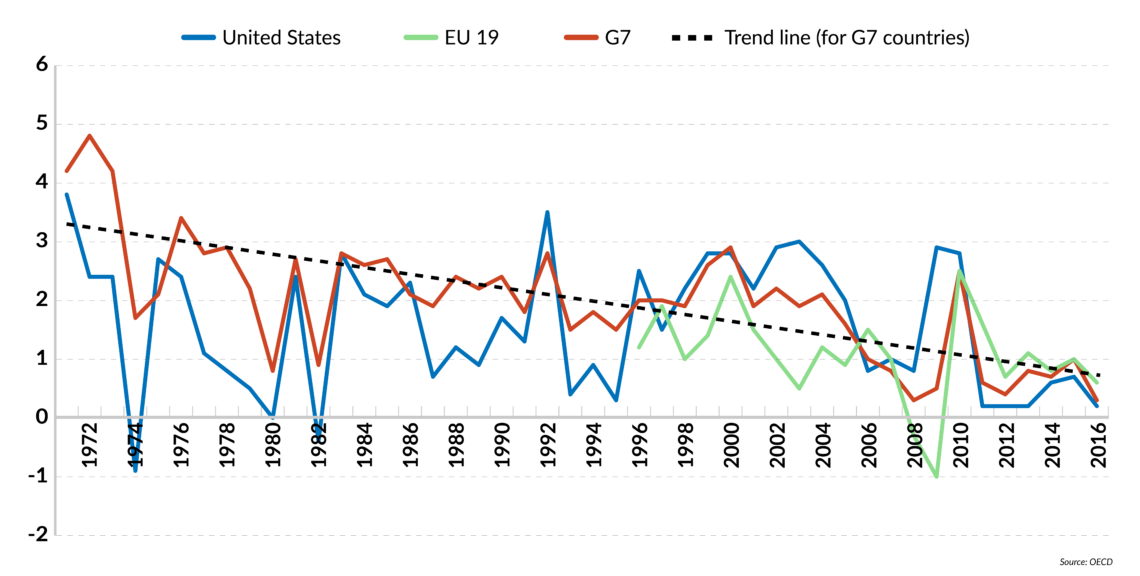Low productivity puts Western economies at a crossroads
Productivity is the key to economic success and a determinant of future growth. In Europe and North America, this economic driver has been weakening for decades, despite technological progress. Unless Western countries want to take a back seat to Asian economies, they must look at their educational, social welfare and regulatory systems.

In a nutshell
- Low productivity growth has held back Western economies in the past decade
- Poor educational systems, weak motivation and over-regulation have all been at fault
- Inaction could cede a competitive advantage to the rest of the world, especially Asia
Economic growth is a relatively recent historical phenomenon. It began approximately in the 1820s in Great Britain and a few other Western countries, and for the next two centuries was an unmitigated worldwide success. During this period, world gross domestic product per capita increased by a factor of 13. Living standards rose to previously unimagined levels as purchasing power increased, working hours dropped, and working conditions improved all over the world. Despite rising income inequality, worldwide poverty has declined: the percentage of the world population living in extreme poverty dropped from 84 percent to less than 10 percent over this period.
Missing link
The key to all this was productivity growth. As classical economics underscores, the purchasing power and well-being of each individual depend on how much he or she produces – in other words, on the value of his or her productivity. That’s all. Tricks like fiscal expansion leading to larger public debt, or lax monetary policies that boil down to printing more money (or promising to do so) are eyewash. Indeed, they make things worse by introducing unnecessary distortions.
Not surprisingly, then, low productivity growth goes a long way toward explaining why growth has slowed down in recent decades in the United States and Europe, regardless of impressive advances in science and technology. This phenomenon is particularly evident in the West. For example, during the past 10 years, labor productivity increased at average annual rates of 0.2 percent in Germany, 0.8 percent in the European Union and 1.3 percent in the U.S. Low productivity growth also explains why many commentators worry about the future of output growth in the West.
Will productivity growth recover in the near future? The prospects do not look bright, despite the opportunities offered by science and technology. Three factors explain this negative outlook: education, motivation and entrepreneurship.
Skills shortage
Inadequate education is a problem shared by many countries. According to data recently released by the UNESCO Institute for Statistics, in the world “750 million adults – including 102 million people between the ages of 15 and 24 – cannot even read or write a simple sentence.” True, this data includes many undeveloped countries. Yet, the West has little to celebrate. For example, according to a United Nations research project published in 2012, functional illiteracy (a condition in which people lack the reading or writing skills needed to function autonomously) affects over 14 percent of the adult population in Germany, 20 percent in the U.S., 22 percent in the United Kingdom, and a staggering 47 percent in Italy.
This has consequences. Illiterate and functionally illiterate people find it difficult to work within large organizations (e.g., a corporation), to interact with relatively sophisticated bureaucratic systems and to absorb new knowledge and procedures. Such individuals lack the flexibility to move from one task to another or from one company to another and, more generally, to make informed, responsible decisions in a rapidly changing environment.
There is a large mismatch between what technology offers and what the workforce can absorb.
Even if scientists and engineers expand the knowledge frontier and possibilities for development, many of these opportunities are wasted by an inability to convert them into state-of-the-art production. Indeed, the data on functional illiteracy underestimate the mismatch between what technology offers and what the workforce can absorb. In many Western countries, most of the educated labor force is trained in nontechnical areas. As a result, we lack technicians and engineers, while political scientists, accountants, would-be managers and men and women of letters are in excess supply. The resulting skilled labor shortages hurt productivity growth.
Moreover, this imbalance necessarily leads to larger inequalities in the distribution of income, as the demand for trained engineers remains unmet, while large numbers of people at the bottom of the wage scale compete for low-value-added jobs. Naturally, these imbalances lead to rising social and political tensions. Income redistribution is a palliative cherished by populist leaders, but hardly a solution to the underlying structural mismatch.

Weaker work ethic
Motivation is another problem. Far too many young people on both sides of the North Atlantic consider working as a way to make a modest amount of money that allows them to meet their priorities: leisure and socializing. The required sum varies by region, but the core issue is usually the same: distorted incentives and low ambition.
The origin of this attitude is twofold. On the one hand, investing in the human capital required to climb up the income ladder is perceived as an arduous and expensive endeavor, while the after-tax rewards do not seem appealing enough compared with the worst-case alternative (living off the welfare state). Of course, the lower performing the educational system and the higher the tax burden, the greater the temptation to give priority to goals other than work.
The expansion of the welfare state has weakened and replaced the ethos of individual responsibility.
On the other hand, and more generally, the expansion of the welfare state has weakened and replaced the ethos of individual responsibility. As a result, the once-dominant stigma of unemployment and failure is no longer a powerful impulse to better one’s lot. Instead, it strengthens calls for redistribution and attempts to protect one’s offspring. The ambition to lead an easy life has replaced the work ethic and a sense of self-respect.
Lack of motivation can also reduce the benefits of education. Unmotivated employees will not get the most out of technology and their skills become obsolete faster, since they are not being constantly refined and upgraded. In economic terms, this means that fixed capital is underutilized and maintenance costs soar.
Regulatory context
Fundamentally, productivity growth depends on whether entrepreneurs can convert scientific and technological opportunities into successful production stories. Having an educated and motivated workforce helps, of course, and this consideration often shapes decisions to relocate production or new investment to other countries.
However, one should not underestimate the role in investment decisions of the regulatory environment. This includes institutional uncertainty (especially when the rules are arbitrarily interpreted or change frequently), the quality of the state bureaucracy, and judicial slack (inadequate contract enforcement). All these elements can make business initiatives more hazardous and reduce the return on investment. If conditions are sufficiently onerous, entrepreneurs will simply move away or switch to unproductive activities, depriving the economy of its driving force.
Waiting for the boom
Poor education, flagging motivation and frustrated entrepreneurship have all contributed to lower productivity growth in Europe and North America. These trends are deeply rooted and will not disappear overnight. In fact, they appear here to stay for another generation or so.
Luckily for the West, the situation described above does not apply to the rest of the world. For example, Asia now offers a radically different picture that could offer business opportunities for Western producers as well. The Asian countries are far from homogeneous, of course. Yet almost everywhere, educational standards are rising rapidly, with an emphasis on numerical literacy. Moreover, the younger generations are ambitious and hardworking, while regulation is far less stringent and more sensitive to the producers’ needs than in Western countries.
Other regions may take advantage of Western torpor to forge ahead in many industries.
This suggests it is time for political elites in Europe and the U.S. to wake up to the real problem. Policy tweaks are not the answer. Instead, governments need to start focusing on how to reform (liberalize) their educational systems, revive individual responsibility (scale down the welfare state) and restore the spirit of entrepreneurship (deregulate). In the meantime, other regions of the world may take advantage of our torpor to forge ahead in many industries. However, complaining would be useless and starting trade wars self-defeating.
Learning from past mistakes, reevaluating our populist delusions and letting individuals decide for themselves is the way to revive growth. If we decline to adopt this course, the alternative is not disaster – at least not right away. For a time, the advanced economies can take a comfortable back seat to their more dynamic rivals. And as they wait, social and political tensions will grow between the technocratic elite and a poorly educated yet vociferous crowd of discontented workers.







